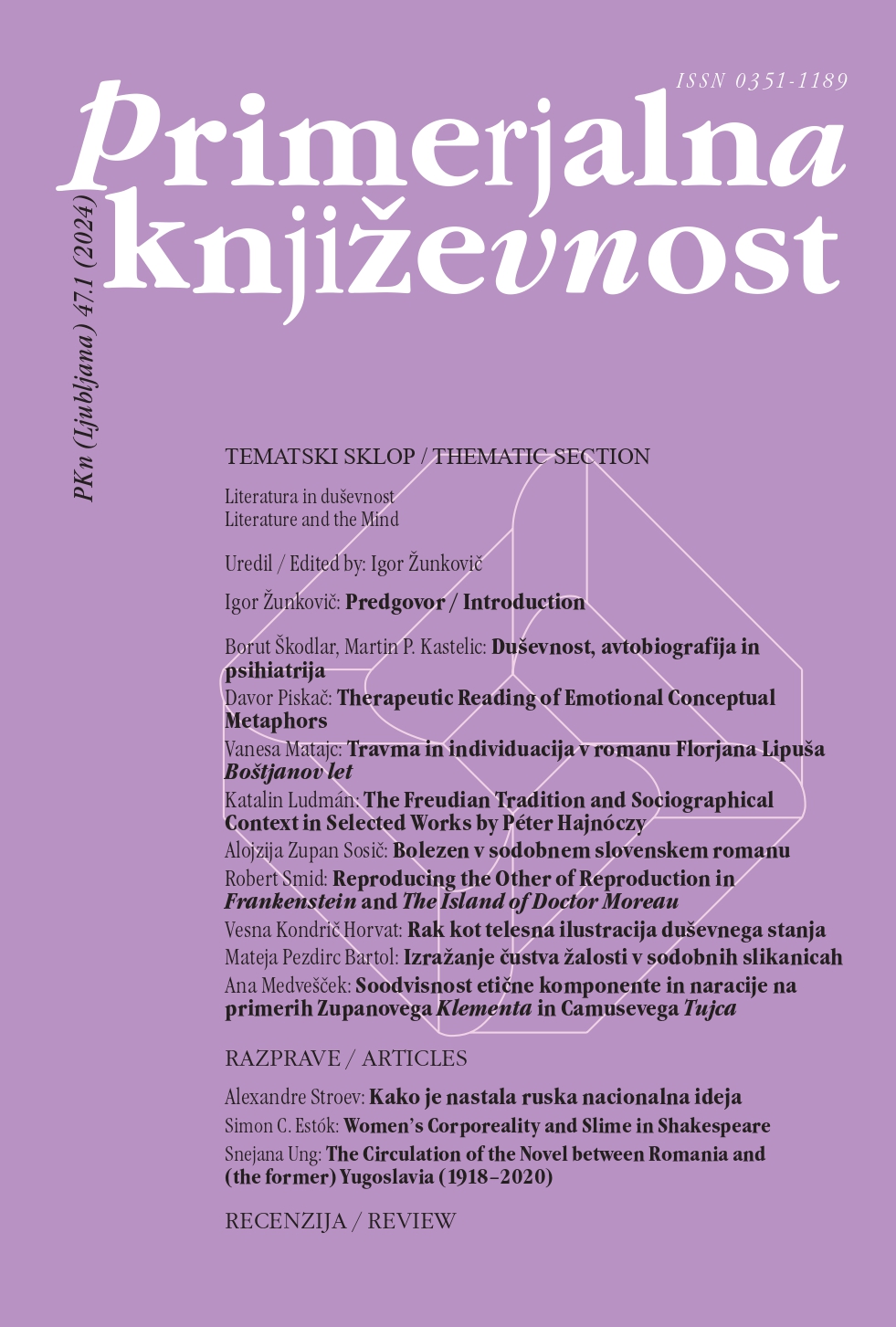“My Monstrous Progeny”: Reproducing the Other of Reproduction in Frankenstein and The Island of Doctor Moreau
DOI:
https://doi.org/10.3986/pkn.v47.i1.06Keywords:
English literature, science fiction novel, Shelley, Mary: Frankenstein, Wells, H. G.: The Island of Doctor Moreau, Lacanian psychoanalysis, monster theory, reproduction, the figure of the motherAbstract
This article provides an interpretation, influenced by Lacanian psychoanalytic theory, for two seminal works of British horror fiction from the nineteenth century: Frankenstein (1818) by Mary Shelley and The Island of Doctor Moreau (1896) by H. G. Wells. In the first part of the article, I discuss the importance of Frankenstein destroying the unfinished female companion of his monster. In the second part, I analyze how the proto-genetic insights that Moreau gained in his quest for the successful reproduction of uplifted beasts are used to inscribe his symbolic father function. In the conclusion, I analyze Frankenstein’s and Moreau’s own respective ways of reinscribing their experiments into the natural order of things and how they eventually displace the male creator into the symbolic position of the mother and thus overwrite the trope of mother nature as well. This is why Frankenstein’s and Moreau’s creations simultaneously transgress all limits and demonstrate (monstrare) the very limits that the binary logic of presence and absence inevitably enact.
References
Baker, Timothy C. Writing Animals: Language, Suffering, and Animality in Twenty-First-Century Fiction. Palgrave Macmillan, 2019.
Cartron, Laure. “Degeneration and ‘Alienism’ in Early Nineteenth-Century France.” Heredity Produced: At the Crossroads of Biology, Politics, and Culture, 1500–1870, edited by Straffan Müller-Wille, and Hans-Jörg Rheinberger, MIT Press, 2007, pp. 155–173.
Cohen, Jeffrey Jerome. “Monster Culture (Seven Theses).” Monster Theory: Reading Culture, University of Minnesota Press, 1996, pp. 3–25.
Derrida, Jacques. Life Death. University of Chicago Press, 2020.
Derrida, Jacques. The Animal That Therefore I Am. Fordham University Press, 2008.
Derrida, Jacques. The Beast & the Sovereign. Vol. I. University of Chicago Press, 2009.
Draper, Michael. H. G. Wells. Macmillan, 1987.
Estók, Simon C. “The Ecophobia Hypothesis: Remembering the Feminist Body of Ecocriticism.” International Perspectives on Feminist Ecocriticism, edited by Greta Gaard, Simon C. Estók and Serpil Oppermann, Routledge, 2013, pp. 70–84.
Gledening, John. “‘Green Confusion’: Evolution and Entanglement in H. G. Wells’s The Island of Doctor Moreau.” Victorian Literature and Culture, vol. 30, no. 2, 2002, pp. 571–591.
Halberstam, Judith. Skins Shows: Gothic Horror and the Technology of Monsters. Duke University Press, 1995.
Haraway, Donna. Simians, Cyborgs, and Women: The Reinvention of Nature. Routledge, 1991.
Haynes, Roslynn D. H. G. Wells: Discoverer of the Future. Macmillan, 1980.
Huet, Marie-Hélène. Monstrous Imagination. Harvard University Press, 1993.
Kittler, Friedrich A. Discourse Networks 1800/1900. Stanford University Press, 1990.
Krevel, Mojca. “The Monstrous Cosmos of Jeanette Winterson’s Frankissstein.” Elope, vol. 18, no. 2, 2021, pp. 85–100.
Kristeva, Julia. “L’abjet d’amour.” Tel quell, no. 91, 1982, pp. 17–33.
Kristeva, Julia. Powers of Horror: An Essay on Abjection. Columbia University Press, 1982.
Lacan, Jacques. Écrits. W. W. Norton & Company, 2005.
Lacan, Jacques. Seminar I. Freud’s Papers on Technique. W. W. Norton & Company, 1991.
Lacan, Jacques. Seminar II. The Ego in Freud’s Theory and in the Technique of Psychoanalysis. W. W. Norton & Company, 1991.
Lacan, Jacques. Seminar IV. The Object Relation. Polity, 2020.
Lacan, Jacques. Seminar V. Formations of the Unconscious. Polity, 2017.
Lacan, Jacques. Seminar XX. Encore. W. W. Norton & Company, 1999.
Latour, Bruno. “Visualisation and Cognition: Drawing Things Together.” Knowledge and Society Studies in the Sociology of Culture Past and Present Vol. 6, edited by Henrika Kuklick, Jai Press, 1986, pp. 1–40.
Morton, Timothy. Ecology Without Nature: Rethinking Environmental Aesthetics. Harvard University Press, 2007.
Nietzsche, Friedrich. Nachgelassene Fragmente 1880–1882. Deutscher Taschenbuch Verlag, 1999.
Shelley, Mary. Frankenstein. Hungry Minds, 2001.
Smid, Robert. “Why Did the Signifier Cross the Railroad? The Mediality of Language According to Jacques Lacan’s Psycho-Semiotics.” Sprachmedialität: Verflechtungen von Sprach- und Medienbegriffen, edited by Hajnalka Halász and Csongor Lőrincz, transcript, 2019, pp. 405–438.
Wells, H. G. The Island of Doctor Moreau. Penguin, 2005.
Yoon, Hyaesin. “Feral Biopolitics: Animal Bodies and/as Border Technologies.” Angelaki, vol. 22, no. 2, 2017, pp. 135–150.
Žižek, Slavoj. The Sublime Object of Ideology. Verso, 2009.


